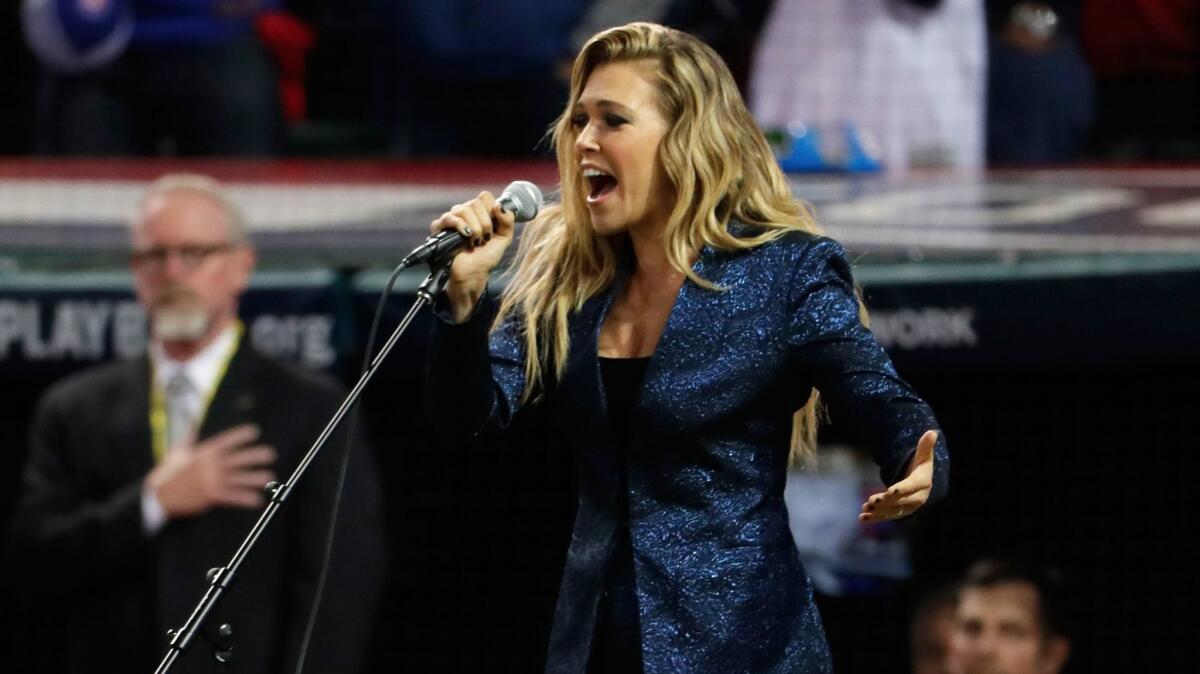Rachel Platten on Hillary Clinton’s use of ‘Fight Song’: ‘I was a little scared at first’

- Share via
Rachel Platten’s “Fight Song” has been used by corporations, sports teams and at least one 7-year-old cancer patient to inspire all kinds of emotional uplift.
But anyone who’s paid close attention to the presidential election that (finally!) ends Tuesday, probably knows the tune best as Hillary Clinton’s go-to event anthem.
A surging electro-pop production about how one match can make an explosion, “Fight Song” was featured prominently at the Democratic National Convention (including in a video starring Elizabeth Banks and friends), and it’s likely to figure into any Clinton victory party that might take place Tuesday night.
Yet Platten didn’t write the song, which came out in early 2015, about politics. Instead, she was describing the resolve she felt she had to muster to make it in the music industry after years of disappointment.
To get her thoughts on where the song has traveled since then, I called Platten on Monday night for a kind of informal exit poll. These are excerpts from our conversation.
Take me back to when you learned the Clinton campaign wanted to use “Fight Song.” What was your reaction?
I was a little scared at first just because I knew the song meant a lot to a lot of people — and politics, no matter how important, divide us. I was a little frightened about that. But I’m proud of how it’s been used. I don’t have any regrets about it.
Before this, did you pay much attention to the ways politicians use pop songs?
Not really. I usually listen to music with songwriting in mind: What can I learn from that song? What can I take from it? What can I do better in my own writing? My focus was never on politics.
Nor was it when you were writing “Fight Song.”
Right: I wrote the song when I needed it, when I needed a reminder of my own strength and not to give up after trying to fight for my dreams for 12 years.

And yet politics really pushed the song into the world.
Well, the song was already triple platinum at the time, so it had already been out there [laughs]. I’d already done big things with the song; I’d toured around the country, played around the world with it and heard responses from people.
You’re saying it didn’t need Clinton’s boost.
No, but I was so proud to see that it was taking on a new life. And I love that the song helped her. I feel like she’s a fighter, and I love that she got to take those words and make them feel like her own.
When you play the song now ...
If your question is, “Does Hillary cross my mind?” no story that I’ve heard has any more of an impact than any other. Hillary’s usage of it doesn’t affect me any more than a little kid in a hospital that I’ve gotten to play for, or any more than a soccer team that’s used it to win. All of these stories are beautiful to me.
I assume you’ve experienced blowback online.
Absolutely — and it hurts. I’ve written songs about that feeling. But in those moments I just realize this is so small in comparison to what other people have faced; it’s just my ego if I’m hurt by it. I try to remember the people that really need the song. That’s what matters. The hate I get on Twitter? That stuff’s not important.
Is there any part of you that’s looking forward to getting the song back to yourself after the election?
Oh, gosh — it’s always been mine. I don’t think I’ve lost it.
Twitter: @mikaelwood
More to Read
The biggest entertainment stories
Get our big stories about Hollywood, film, television, music, arts, culture and more right in your inbox as soon as they publish.
You may occasionally receive promotional content from the Los Angeles Times.









